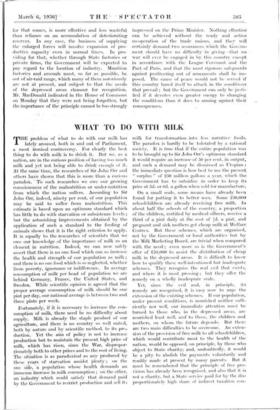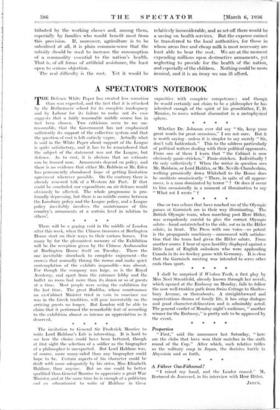WHAT TO DO WITH MILK
application of such a is to the feeding of animals shows that it is the right criterion to apply. It is equally to the researches of scientists that we owe our knowledge of the importance of milk as an element hi nutrition. Indeed,- we can now safely assert that there is no one food Which can so increase the health and strength of our population as milk ;" and there is no one food which is so neglected, whether from pOverty, ignorance or indifference. In average consumption of milk per head of population we arc behind Germany, France, the United States, and Sweden. While scientific opinion is agreed that the proper average consumption of milk should be one pint per day, our national average is between two and three pints per. week. . . Fortunately, if it is necessary to increase the con- sumption of milk, there need be no difficulty about supply. Milk is already the staple product of our agriculture, and there is no country so well suited, both by nature and by scientific method, to its pro- ductiOn..- Yet- the aim of policy is not to increase production but to maintain the present high price of milk, which has risen, since the War, dispropor- tionately both to other prices and to the cost of living. The situation is as paradoxical as any produced by these years, ' of starvation amidst Plenty ; on the one side, '4 population whose health demands an immense increase in milk consumption ; on the other, an induatiry which could satisfy that demand paid by the CoVernmerit to restrict production and sell its milk for transformation into less nutritive foods. The paradox is hardly to be tolerated by a rational Society. It is true that if the entire population was to be brought up to Sir John Orr's optimum standard it would require an increase of 50 per cent. in output, and such a demand may be dismissed as Utopian the immediate question is how best to use the present " surplus." of 250 million gallons a year, which the Government has to subsidise in order to keep its, price at 5d. or 6d. a gallon when sold for manufacture.
On a small scale, some means have already been found for putting it to better uses. Some 250,000 schoolchildren are already receiving free milk. In about half the schools of the country, a proportion Of the children, certified by medical officers, receive a third of a pint daily at. the cost of N. a pint, and pregnant and sick mothers get cheap milk at Welfare Centres. But these schemes, which are , organised, not by the Government or local authorities but by the Milk Marketing Board, arc trivial when compared with the need ; even more so is the Government's Offer of £50,000 to assist the distribution of cheap Milk in the depressed areas. It is difficult to know how to. qualify these well-intentioned but inadequate sehemes. They recognise the real evil that exists, and where it is most pressing ; but they offer the remedy on a wholly inadequate scale.
Yet, since the evil and, in principle, its remedy arc recognised, it is easy now to urge the extension of the existing schemes. If our population, Under present conditions, is nourished neither sufli- Ciently nor well, our immediate attention must be turned to those who, in the depressed areas, are nourished least well, and to those, the children and mothers, on whom the future depends. But there are two main difficulties to be overcome. An exten- sion of the provision of free milk to all schoolchildren, which would contribute most to the health of the nation, would be opposed, on principle, by those who Object to State charity; and, undoubtedly, it would be a pity to abolish the payments voluntarily and readily made at present by many parents. But it must be remembered that the principle, of free pro- vision.has already been -reCogni4cd, and also that it is not a charity, but a State' service paid for by the dis- proportionately high share of indirect taxation eon- tributed by the working classes and, among them, especially by families who would benefit most from this provision. If, moreover, agriculture is to be subsidised at all, it is plain common-sense that the subsidy should be used to increase the consumption of a commodity essential to the nation's health. That is,-of all forms of artificial assistance, the least open to serious objection.
• The real difficulty is the cost. Yet it would be relatively inconsiderable, and as set-off there would be a saving on health services.- But.the expense cannot be transferred to the local authorities, for those in whose areas free and cheap milk is most necessary arc least able to bear the cost. We are at the moment expending millions upon destructive armaments, yet neglecting to provide for the health of the nation, and especially of the children. Nothing 'could be more ironical, and it is an irony we can ill afford.

















































 Previous page
Previous page